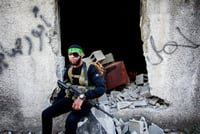
In a sophisticated and long-term intelligence operation, Israel managed to exploit Hezbollah's leader Hassan Nasrallah's paranoia about cellular communications, leading the organization to unknowingly purchase booby-trapped pager devices directly from an Israeli front company.
The New York Times reveals new details behind the scenes of the pager attacks in Lebanon and Syria, which led to thousands of wounded and dozens of casualties among Hezbollah militants.
Nasrallah has long since been aware of the dangers of mobile phones, which he knows can easily be hacked by Israel. However he became increasingly worried after allies claimed that Israel had acquired new means to hack into phones, allegedly able to activate microphones and cameras remotely to spy on their owners.
Intelligence officials reported that Israel had invested millions in developing this technology, spreading fear among Hezbollah and its allies that no cellphone communication – even through encrypted messaging apps – was safe anymore.
In response, Nasrallah not only banned cellphones from Hezbollah meetings but also ordered that details of Hezbollah movements and plans never be communicated over cellphones. He mandated that Hezbollah officers carry pagers at all times, and in the event of war, pagers would be used to direct fighters.
According to the report, as a result of Israel's successful assassinations of Hezbollah fighters, Nasrallah came to a critical conclusion: If Israel was going high-tech, Hezbollah would go low.
As far back as February, Nasrallah begged his followers: "You ask me where is the agent. I tell you that the phone in your hands, in your wife's hands, and in your children's hands is the agent." He then commanded them to "Bury it. Put it in an iron box and lock it."
So how were Hezbollah fighters supposed to communicate without their phones?
Pagers.
And here's where Israel got involved, seeing an opportunity to use Nasrallah's paranoia to their advantage.
Israel set in motion a plan to establish a shell company that would pose as an international pager producer. Even before Nasrallah's decision to expand pager usage, this plan was already underway.
The result was B.A.C. Consulting, a Hungary-based company contracted to produce pager devices on behalf of a Taiwanese company, Gold Apollo. In reality, B.A.C. Consulting was part of an Israeli front operation. At least two other shell companies were also created to mask the true identities of the people behind the pagers: Israeli intelligence officers.
While B.A.C. did take on ordinary clients and produce standard pagers, its primary target was Hezbollah. The pagers destined for the terrorist organization were far from ordinary. Produced separately, these devices contained batteries laced with the explosive PETN, according to intelligence sources.
The pagers began shipping to Lebanon in small numbers in the summer of 2022. However, production rapidly increased after Nasrallah's public denunciation of cellphones.
Over the summer, shipments of the weaponized pagers to Lebanon increased dramatically. Thousands of devices arrived in the country and were distributed among Hezbollah officers and their allies, according to American intelligence officials.
To Hezbollah, these pagers represented a defensive measure against Israeli surveillance. However, in Israel, intelligence officers referred to the pagers as "buttons" that could be activated when the time was deemed right.
We now know that time was two days and yesterday (Tuesday and Wednesday) as Israel detonated pagers and then walkie talkies to devastating effect.
Hezbollah is still reeling from these attacks, while Israel is moving tanks and IDF soldiers up north in what seems to be preparation for a possible full-scale war.
The New York Times contributed to this article.














1 Comments